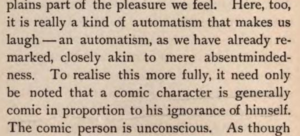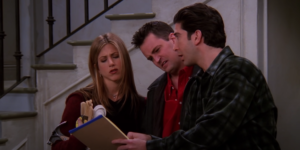 The use of background laughter in sitcoms such as Friends or Mr. Bean, aligns with Bergson’s theories about laughter that is elicited through “automatism.” In my opinion, laughter is at once a result of the character’s absentmindedness as Bergson argues but also becomes a response that can be controlled and forced especially through background laughter that is interwoven between scenes. The protagonist Mr. Bean, himself appears “unconscious” and absentminded in his daily gags, resulting in laughter from the audience.[1] Similarly, in Friends Ross does not realise how frustrating his repetition of “pivot” is to Chandler and Rachel who are trying to help him. Hence, to follow Bergson’s argument the comic character is comic as a result of his “ignorance of himself.” In Mr. Bean, the man’s laughter and Mr. Bean’s reaction to his laughter becomes funny given the lack of knowledge regarding his reasons for laughter. Both Mr. Bean and the audience are unaware, and ‘made comical’ as the man appears to laugh at us. Here, the laughter appears involuntary, and provokes the audience to laugh, sharing the same motive as background laughter.
The use of background laughter in sitcoms such as Friends or Mr. Bean, aligns with Bergson’s theories about laughter that is elicited through “automatism.” In my opinion, laughter is at once a result of the character’s absentmindedness as Bergson argues but also becomes a response that can be controlled and forced especially through background laughter that is interwoven between scenes. The protagonist Mr. Bean, himself appears “unconscious” and absentminded in his daily gags, resulting in laughter from the audience.[1] Similarly, in Friends Ross does not realise how frustrating his repetition of “pivot” is to Chandler and Rachel who are trying to help him. Hence, to follow Bergson’s argument the comic character is comic as a result of his “ignorance of himself.” In Mr. Bean, the man’s laughter and Mr. Bean’s reaction to his laughter becomes funny given the lack of knowledge regarding his reasons for laughter. Both Mr. Bean and the audience are unaware, and ‘made comical’ as the man appears to laugh at us. Here, the laughter appears involuntary, and provokes the audience to laugh, sharing the same motive as background laughter.



Bergson also argues that “our laughter is always the laughter of the group” and must be felt in communion with others rather than in isolation. The use of such background laughter every time one of the character’s makes a comedic action or expression, serves to guide the audience to elicit a reaction. It also ensures that the audience can watch these sitcoms by themselves whilst feeling that they are in the company of others. This forced propelling of the audience towards laughter highlights how calculated and automaton-like the laughter really is. Its absence would make a scene less comedic. As a result, in these sitcoms laughter in itself is equivalent to a premediated mechanism similar to the working of machines. Rather than serving as a form of venting pent-up emotion, it becomes a forced reaction.
[1] Henri Bergson, “Chapter 1,” Laughter, trans. Brereton & Rothwell (London: MacMillan, 1911), 1-66.
Very interesting read! I too was fascinated by Bergson’s thoughts on laughter as a communal experience, a positive feedback loop of sorts where laughter by one begets laughter for all.
I’m particularly interested in your comment that an “absence [of background laughter] would make a scene less comedic”. Seeing edited versions of such scenes where the background laughter is entirely removed does make for a rather creepy experience, as though it is the laughter that fools us into thinking a scene is funny when in reality it is not. There is plenty of media that can elicit laughter by naturally comedic ways, never once relying on manipulating its audience in this way. Does it then follow that a scene relying on ‘canned laughter’ is objectively not comedic?